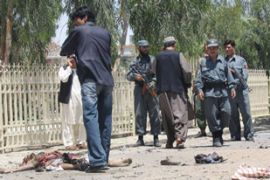Pakistan blamed over Afghan bombers
UN report says over 80 per cent of suicide attackers are recruited in Pakistan.

Published On 9 Sep 2007
Others were somehow persuaded they would survive and earn rewards such as cash, a motorcycle or a cell phone, it said.
The “majority of those who came from Pakistan are Afghan, but not all, either refugees or coming in and out of Afghanistan,” said Tom Koenigs, the head of UNAMA, before the document’s release.
As of the end of August 2007, there have been 103 suicide attacks in Afghanistan, compared to 123 for the whole of 2006, the UN said.
There were just 17 in 2005.
While the targets were exclusively military or government, 80 per cent of the 183 victims until June this year were civilians, it said.
Tribal areas
The report said that the bombs were not claiming more lives per attack, suggesting little sustained innovation in technique.
| External link |
It said this contradicted a widely repeated assessment that expertise from Iraqi fighters was being imported into Afghanistan.
“The tribal areas of Pakistan remain an important source of human and material assistance for the insurgency generally but suicide attacks in particular,” the report said.
“The phenomenon of suicide attacks in Afghanistan is inherently linked to a variety of structures and institutions across the border in Pakistan,” it said.
The report said action was needed to destroy safe havens used by potential bombers in Pakistan.
Pakistan has deployed tens of thousands of troops in tribal areas in an attempt to uproot pro-Taliban fighters.
Nonetheless, Afghans were also providing “necessary support to suicide cells within Afghanistan such as safe houses, training facilities and in many cases explosives.”
Suicide attacks also contributed to the alienation of people from government since “the state and its security forces are perceived to have failed to ensure the necessary safety and protection”, the report said.
‘Root causes’
The study urged US and other Nato forces to try to prevent civilian casualties, avoid humiliating property searches and if possible deploy forces from Muslim nations as ways of stemming support for the bombers.
 |
| Most of the casualties from the attacks are civilians [EPA] |
“The first line of defence consists of understanding and removing ‘root causes’ that create demand for terrorism,” the 137-page report said.
Troops had this year killed about the same number of civilians as the fighters had, it said.
“All affairs are done by the Americans and other foreigners,” said Munir, a 19-year-old Afghan quoted in the report who said he was arrested after planning a car bomb attack.
“They are invaders. The war against them is jihad.”
Another prisoner, 16-year-old Ghulam, said he was drugged and offered money to take part in a mission.
“They kept saying I would not be killed,” he was quoted as saying.
“They also said that if I didn’t do what they say I would go to hell.”
Source: News Agencies